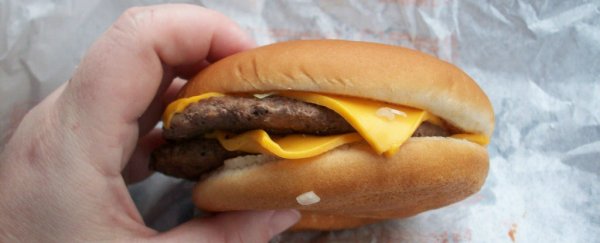Researchers have found a link between feelings of inferiority and eating more food, as well as eating food with higher fat content - a result that could help explain why people of lower socio-economic status in high-income countries are more likely to be obese.
While there are many factors that explain why those struggling with money are less likely to eat well - the convenience and cheapness of junk food, or the way sugar helps stress - the study suggests that a psychological link could be involved too.
Researchers from Nanyang Technological University in Singapore and the Chinese University of Hong Kong say this tendency to eat whatever we can get hold of when times are tough could have its roots in our evolutionary history.
So when resources are scarce, a survival instinct kicks in: we become less picky about what we eat, and eat more food when it's available.
"Here we show that the mere feeling of lower socio-economic status relative to others stimulates appetite and food intake," the team explains in their paper.
The study was made up of four experiments involving 499 volunteers in total. In each test, participants were asked to rank their social status on a ladder with 10 rungs - some in relation to those better off, to stimulate feelings of inferiority, and some in relation to those worse off, to get the opposite effect.
For the first experiment, 101 volunteers were asked to pick foods from a hypothetical buffet.
After factoring out hunger levels, usual eating patterns, and gender, the researchers found that those who gave themselves a lower social status chose more food, and also chose more of the high-calorie foods.
In test two, 167 people had to assign emotional descriptions to both high-calorie foods (like pizza and burgers) and low-calorie foods (like vegetables and fruit). Those who had had to rank themselves as lower on the social ladder gave the high-calorie foods more positive labels.
The third experiment involved some actual eating: 83 participants were asked to pick a movie snack from raisins, sweets, or chocolate. The self-ranked lower class were found to be more likely to pick sweets or chocolate, and took in an average of 34 more calories each.
Finally, the fourth experiment involved 148 volunteers, who were each given a big bowl of noodles and asked to eat until they were comfortably full. As you can probably predict from the previous experiments, those who gave themselves a lower social rank tended to eat more - an average of 201 grams compared with 169 grams, or about 20 percent more.
"These findings suggest that mindsets of deprivation and low social standing may be critically linked to obesity risk via increased intake of calories," the team concludes.
Why does this matter? It suggests that just feeling lower class or inferior to other people could be enough to harm our diets, irrespective of any other factors - and that insight might help us tackle our growing obesity problems.
Plus, the volunteers didn't actually experience any of the effects of being lower class, such as heightened stress or money worries - they were simply feeling superior or inferior - and so even those on a decent wage could be drawn to junk food if they're surrounded by people they see as richer and better off.
In the end, healthy eating could be about more than promoting exercise and nutritional foods - we need to feel good about ourselves too. Let's hope further research can help bring more help to those who need it most.
The findings are reported in the Proceedings of the National Academy of Sciences.
